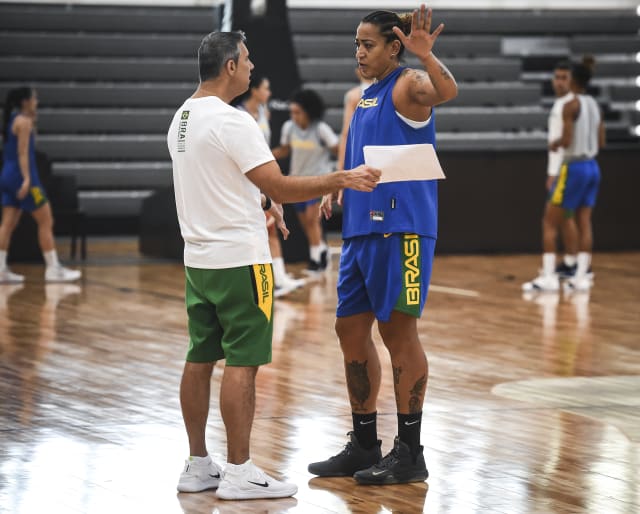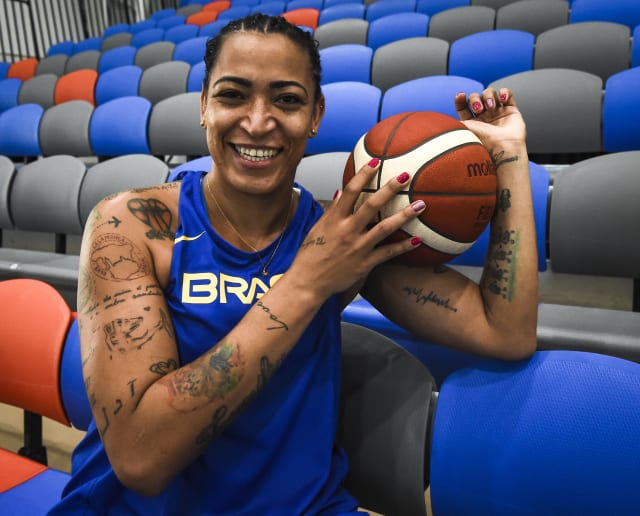Érika De Souza, forever
The marks on her body portray a long road traveled. The tattoos that decorate Érika De Souza's skin guide us through the personal and professional universe of a Brazilian basketball legend.
The marks on her body portray a long road traveled. The tattoos that decorate Érika De Souza's skin guide us through the personal and professional universe of a Brazilian basketball legend. Her left wrist reads “Genair”. Dona Genair, Érika's maternal grandmother, is the most important person for the Brazilian center. “My grandmother's everything to me. After I lost my mother I decided to keep playing and living outside of my country because of my grandmother. Everything I do is for her, who's already 88, because thanks to her and my mother I'm where I am now. On her birthday seven years ago, I made this tattoo of my grandmother's name. This is the most important one of all I've had because I live far from her and her name on my skin makes me feel her closer. She lived with me in Valencia for four months and every time I can, and she wants to travel, she comes with me.” The number of tattoos that embellish Érika's body is unknown even for this story’s protagonist: “I've already lost count, but I have a lot because I love it. Some mean a lot to me, like the ones that represent my godchildren, the names of my siblings, my dog that died, my city, the most important places where I played – like Atlanta and Salamanca.”
The FIBA Women's Olympic Pre-Qualifying Tournament in Bahia Blanca is one of the steps up the ladder that Érika tries to conquer to get to the highest place in the world – her fourth Olympic Games.” The center attended Athens 2004, London 2012 and Rio de Janeiro 2016. Tokyo 2020 is her final great objective: “It would mean closing the cycle of my career in the national team in the best possible way. After the Olympic Games, I want to stop playing to have children. I got married three years ago and I want to expand my family. Besides the fact that my husband understands me, accompanies me and doesn’t pressure me, at the age of 37 I already want to be a mother, and I want to have two!” Apart from her extensive career, De Souza enjoys each time the national team calls her to play: “It's been 21 years since I started playing with the national team and I love being with my teammates in this environment and surrounded by young people that transmit their energy. When I arrived at the national team, I was with Adriana, Paula, and Janeth, who were all World Champions in 1994. I was able to be with them in the World Cup and the Olympic Games. They helped me a lot when I was very young and now, I try to do the same because I'm more experienced. The only thing was that I wasn't Hortencia's teammate.”

Outstanding in Érika's career are the 12 seasons she played in the WNBA. In 2017, in what was her last campaign in the United States, she was chosen as one of the best 60 players in the history of the competition. For the center having played for so much time in the most important league in the world is a great source of pride: “It meant a lot. I've learned from players I watched on TV and inspired me, like Lisa Leslie, who was my teammate in the Los Angeles Sparks. My arrival at the WNBA also opened doors to other Brazilian players like Nadia Colhado, Clarissa Dos Santos and Dantas Damiris, who’s still there. I'm very thankful for having been a part of that competition.”
De Souza is also an important part of the history of the EuroLeague, with 10 seasons under her belt: “It helped me a lot because Europe plays a different basketball than Brazil and the United States. There I also met excellent players like Amaya Valdemoro, Elisa Aguilar, Anna Montañana, and Elena Tornikidou – a very good Russian player that at the age of 42 still played at a great level. I love playing in Spain because that allows me to bring that game style to Brazil.”
When asked to pick who her basketball idols are, Érika decides to choose three: “Alessandra dos Santos, my teammate of both the national team and in clubs. Lisa Leslie, with whom I was able to win a WNBA championship ring, which was something very special for me because, at just 19 years of age, I was already able to enjoy and play with the best in the world. In my position, center, Dennis Rodman. I think I had my tattoos done because of him. From Rodman, I also have the character inside the court, because I forget everything, and I focus on the game and the number of rebounds I take.”

Érika is a legend and a voice with the experience to back up her analysis of the current state of Brazilian women’s basketball: “Several years ago it was very, very good. There were players from around the world in our league. Now it's not as good as in its best times, but I think that it's slowly starting to recover its level. The successes of the national team, like winning the Pan American Games and the bronze in the AmeriCup… It's very important to recover our best basketball because it will bring sponsors and fans. Also, to be able to bring back players that are overseas so that they can play in the league would be a great example for the youngest ones.”
The challenges that women face in Brazilian basketball are the same as the rest of women's sports. This is what De Souza has to say: “In Brazil and around the world, women's basketball is a bit in a sad state when comparing it to men’s sports, where players win a lot of money, there are a lot of sponsors, and much more exposure. We deserve the same recognition because we also make the effort of leaving our families for a long time. The only thing we don’t do is dunk, but we play the same and some do so even better than the men. We should have the same conditions. We must continue to work and fight so that the situation changes in some years and women win the same or more money than men.”
Érika would've already stopped playing, but she desires to witness the moment when gender equality becomes a reality. Meanwhile, her legendary career keeps growing. Érika de Souza, forever.
Pablo Cormick
FIBA